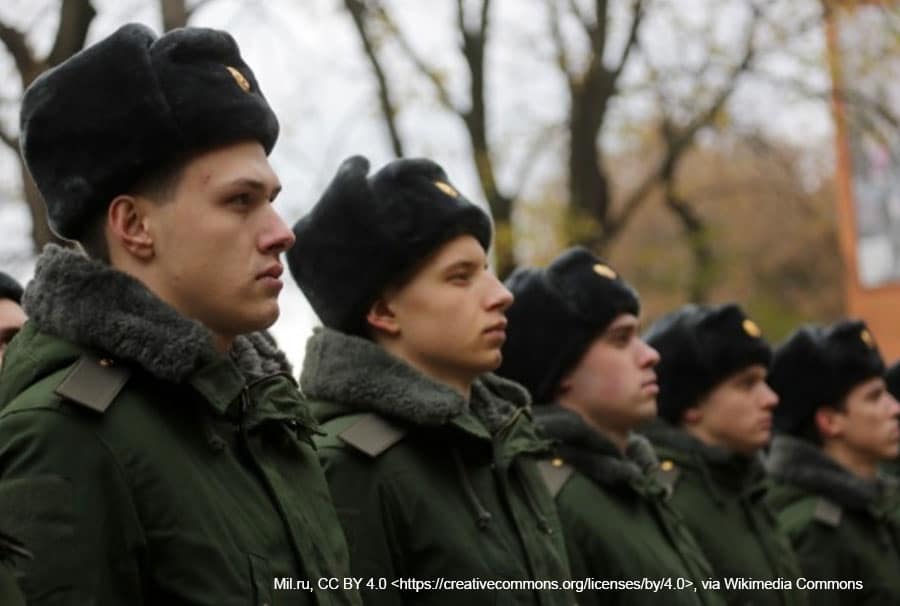Mise en lumière par les échecs des premières phases de l’invasion en Ukraine, l’efficacité militaire russe n’est pas au rendez-vous des réformes engagées sous l’ère Poutine. L’auteur explore et analyse la nature de ses problèmes persistants d’efficacité militaire. Il pointe les déséquilibres civilo-militaires et le contrôle défaillant des forces armées par l’administration civile. Il s’interroge également sur la capacité qu’un prochain cycle de réformes, post guerre en Ukraine, saurait mettre en œuvre pour régler ces problèmes endémiques de leadership politique sur la sphère militaire.
Les opinions exprimées dans cet article n'engagent pas le CNAM.
Les références originales de cet article sont : Kirill Shamiev, «Brass Tacks : why Russia’s military fails to reform », ECFR. Ce texte, ainsi que d’autres publications, peuvent être consultés sur le site de l’ECFR.
“On a freezing winter dawn, a column of Russian troops moved through what the leadership in Moscow considered to be Russian territory. By midday, commanders were receiving alarming reports. In one town at the border, local fighters had stopped the column and burned and overturned 16 trucks. Later, another convoy was ambushed. Heavy casualties began to appear in the reports of military commanders. Soon, a special military operation that was supposed to be small and aimed at crushing an unfriendly political leadership turned into a long, bloody war with thousands of casualties that would change the Russian nation for years to come.”[1]
This story sounds remarkably familiar. But it is not from an early memoir of Russia’s invasion of Ukraine. It is how Russian general Gennady Troshev described the beginning of the first Chechen war in December 1994.
But past is apparently prologue. In 2022, Russian forces invaded Ukraine, a country that Russian president Vladimir Putin often implies is part of Russia. The plan was for the Russian military, supported by Russian intelligence agents, to quickly decapitate the government and occupy the Ukrainian capital of Kyiv. Within hours of crossing the frontier, the first reports of military setbacks and casualties began to roll in. In just a few days, it became clear that the most recent special military operation would in fact be yet another long, bloody war.
Nearly thirty years have passed, and yet the Russian government seems to have repeated the same old mistakes in its most recent war. Prior to the war, many analysts thought that the Russian military had finally reformed itself and put its past failures behind it. Yet, the Russian military significantly underperformed in Ukraine in almost every domain – strategic, operational, and tactical. It failed to achieve its objectives and demonstrated remarkably little progress in planning since the Chechen wars. The extent of its struggles and failures took many analysts, including some Ukrainians, by surprise.
The Russian leadership was no doubt somewhat perplexed as well. In 2000, Putin’s long reign began with military tragedy. Just three months after his taking office as president, the Russian nuclear submarine Kursk exploded and sank in the Barents Sea, killing the crew of 118 sailors. The outcry was so massive that Putin himself had to take part in a clearly uncomfortable conversation with the families of the dead sailors. He promised the grieving relatives a smaller, better-equipped, more technologically advanced military. He has since devoted great effort throughout his tenure to improving the Russian military.
The effects of this effort are clear. From the beginning of 2000 to the end of 2021, the Russian defence budget almost tripled, from $22.84 billion to $65.91 billion (in 2020 US dollars). In those 22 years, Russia spent over $1.1 trillion on the military, had three ministers of defence and four chiefs of the general staff who oversaw three military reforms, a short war with Georgia, an intervention in Syria, and several smaller deployments in former Yugoslavia and the former Soviet republics. Yet, when that military was finally tested in a full-scale conflict, almost nothing appeared to have changed.
Both Russian government and external military analysts have struggled to understand this persistent Russian military failure. Arguably, the issue is that analysts have paid too much attention to measurable factors – weapons, technology, doctrine, and training – and have neglected the more intangible factors such as morale, skills and leadership, which defy easy measurement.
This paper seeks to fill that gap. It starts from the idea that an adequate assessment of Russian military effectiveness must involve two interdependent aspects: material capabilities and the more difficult to quantify factors that lie at the interface between the civilian authorities and the military. These include Russia’s political and administrative institutions, the social norms that regulate military conduct, and military culture, all of which enable the development and use of military force. The paper seeks to explain the role of intangible factors in the Russian military’s failures and to derive lessons from the Russian military’s experience in Ukraine.
The essence of Russia’s military problems stem from the imbalances in Russian civil- military relations and the dysfunctional system of civilian control of the Russian military. Under Putin, the Russian administrative state has ensured the political compliance of the military but, far from enabling better training and equipping of the Russian armed forces, it has often hampered their development and deployment.
During his first eight years in power, Putin was reluctant to argue with the military and failed to support and enforce the reform measures he announced. Later, however, the Kremlin over- centralised political and military decision-making and installed intrusive monitoring and flawed evaluation mechanisms. Such mechanisms only work when the civilians have sufficient expertise to judge the military activities, yet Russian civilian leaders have rarely possessed the necessary skills.
Worse, the civilian reforms failed to break up the competing institutional silos within the Russian security sector, nor did they improve the skills of servicemembers. The reforms undermined Russia’s pre-war material advantages and played a significant role in preventing Russia from achieving success in Ukraine. Even Putin’s complete backing could not save Russian defence policies from the influence of stakeholders in the Ministry of Defence who sought to protect their various institutional interests, nor was Putin’s support sufficient to improve the quality of civilian leadership in the development of the military.
Russia’s poor battlefield performance in Georgia triggered a series of radical reforms in 2008- 2012. These changes did improve the Russian military, as demonstrated in the seizure of Crimea in 2014, the hybrid war in eastern Ukraine after 2014, and the operation in Syria after 2015.
But Russian civil-military relations, the all-important interface between the Russian military and the civil authorities did not see effective reform and glaring problems remained. Before the war with Ukraine, for example, the Kremlin and the Russian Ministry of Defence were not able to improve the human resource component of the military. Military officers lacked adequate training, including leadership and command skills, which undermined the adoption of innovative changes and the battlefield value of modern equipment. Ministry of Defence policies simply could not solve the military’s long-standing quality problems, such as unsatisfactory service conditions, intra-military brutality, corruption, waste, and poor tactical command and control skills.
A similar reform effort is likely after the war in Ukraine, given assessment of the Russian military emanating from a variety of voices, including pro-government Russian ones. Since 2022, many Russian servicemembers, military propagandists (voenkory), retired officers, and Russian analysts have published critical analyses and opinions on the state of the Russian armed forces. The technological revolution in open-source intelligence has provided valuable evidence of Russian battlefield performance, making a mockery of official Russian Ministry of Defence press briefings. Moreover, the sheer number of personnel and amount of equipment lost in Ukraine leaves little room for business as usual after the end of hostilities in Ukraine.
Such a mass of criticism on Russia’s war failures is unlikely to be dismissed by the political leadership in the Kremlin. They will attempt a reform. Previous experience demonstrates, however, that the ultimate outcome of any military reform will depend on improvements in Russian civil-military relations.
In fact, a few days before this report was released, the Kremlin appointed a new minister of defence, Andrei Belousov, dismissing Sergei Shoigu, who became the secretary of the Russian Security Council. Belousov has spent years in the Russian government and presidential administration overseeing the economic portfolio and before this he was an academic economist. Putin’s spokesman said Belousov was right for the job as the security services spend almost 7 per cent of Russia’s GDP, the military and civilian economies need to be better integrated. In the past, Moscow has appointed two previous ministers, Serdyukov and Shoigu, on a similar public pretext, but both of them simply implemented military reforms.
This paper seeks to understand how that reform might proceed. The first section examines Russian military effectiveness in Ukraine and proposes a framework for assessing the military’s performance. The second section explains how civil-military relations have affected Russia’s military effectiveness since 2000 and why so many challenges remain. Finally, the report concludes with the identification of key reforms in Russian civil-military relations.
References
Par : Kirill SHAMIEV
Source : European Council on Foreign Relations
































